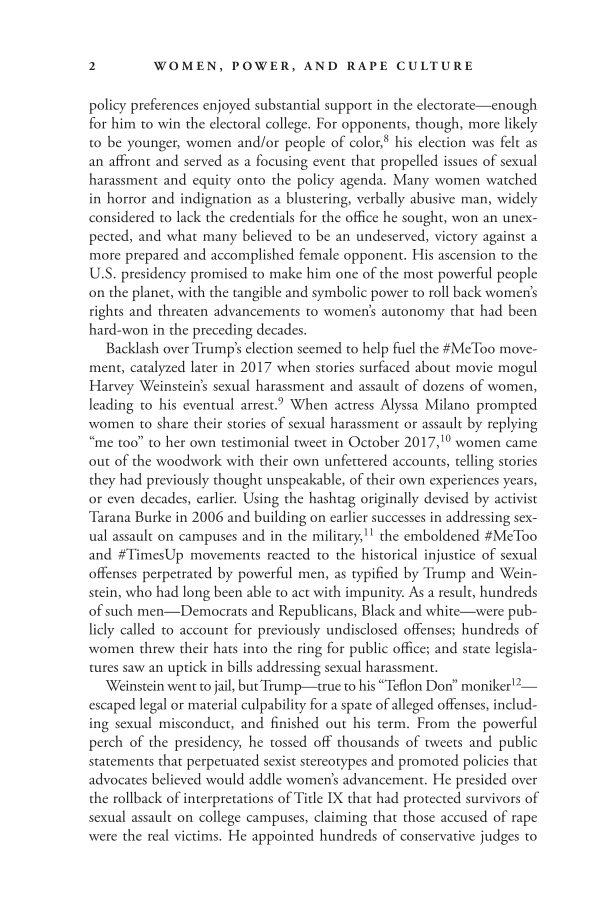W O M E N , P O W E R , A N D R A P E C U L T U R E 2 policy preferences enjoyed substantial support in the electorate—enough for him to win the electoral college. For opponents, though, more likely to be younger, women and/or people of color,8 his election was felt as an affront and served as a focusing event that propelled issues of sexual harassment and equity onto the policy agenda. Many women watched in horror and indignation as a blustering, verbally abusive man, widely considered to lack the credentials for the office he sought, won an unex- pected, and what many believed to be an undeserved, victory against a more prepared and accomplished female opponent. His ascension to the U.S. presidency promised to make him one of the most powerful people on the planet, with the tangible and symbolic power to roll back women’s rights and threaten advancements to women’s autonomy that had been hard-won in the preceding decades. Backlash over Trump’s election seemed to help fuel the #MeToo move- ment, catalyzed later in 2017 when stories surfaced about movie mogul Harvey Weinstein’s sexual harassment and assault of dozens of women, leading to his eventual arrest.9 When actress Alyssa Milano prompted women to share their stories of sexual harassment or assault by replying “me too” to her own testimonial tweet in October 2017,10 women came out of the woodwork with their own unfettered accounts, telling stories they had previously thought unspeakable, of their own experiences years, or even decades, earlier. Using the hashtag originally devised by activist Tarana Burke in 2006 and building on earlier successes in addressing sex- ual assault on campuses and in the military,11 the emboldened #MeToo and #TimesUp movements reacted to the historical injustice of sexual offenses perpetrated by powerful men, as typified by Trump and Wein- stein, who had long been able to act with impunity. As a result, hundreds of such men—Democrats and Republicans, Black and white—were pub- licly called to account for previously undisclosed offenses hundreds of women threw their hats into the ring for public office and state legisla- tures saw an uptick in bills addressing sexual harassment. Weinstein went to jail, but Trump—true to his “Teflon Don” moniker12— escaped legal or material culpability for a spate of alleged offenses, includ- ing sexual misconduct, and finished out his term. From the powerful perch of the presidency, he tossed off thousands of tweets and public statements that perpetuated sexist stereotypes and promoted policies that advocates believed would addle women’s advancement. He presided over the rollback of interpretations of Title IX that had protected survivors of sexual assault on college campuses, claiming that those accused of rape were the real victims. He appointed hundreds of conservative judges to
Document Details My Account Print multiple pages
Print
You have printed 0 times in the last 24 hours.
Your print count will reset on at .
You may print 0 more time(s) before then.
You may print a maximum of 0 pages at a time.









































































































































































































































